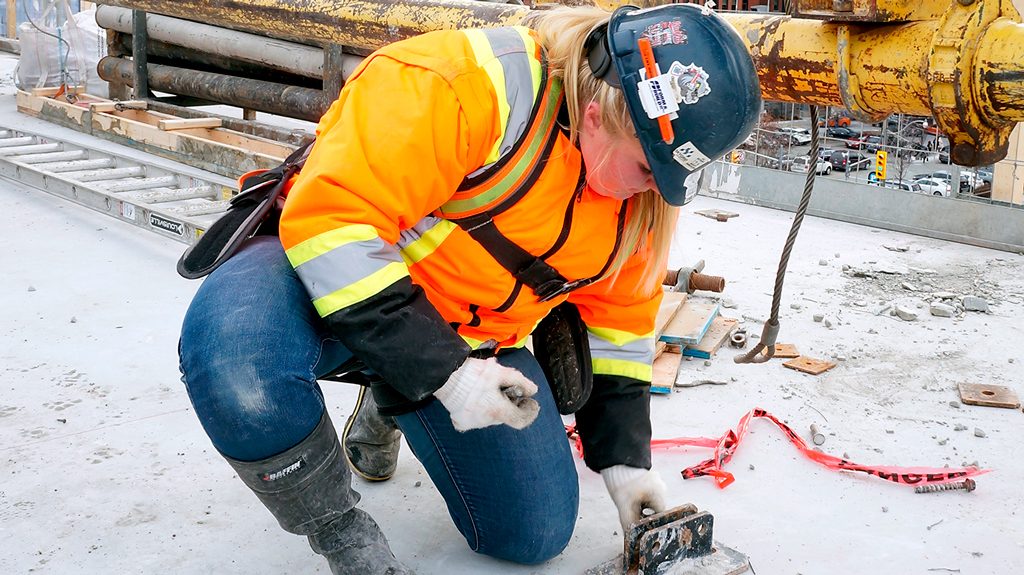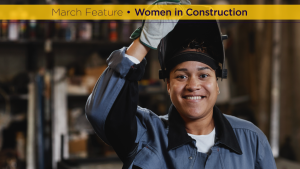The president and CEO of Women Building Futures (WBF) says many of the initiatives in the recently released federal budget show a commitment to empowering women in the skilled trades.
“It is definitely a win-win for everyone,” said Kathy Kimpton. “When you make those kinds of commitments through a budget, what you’re doing is making a commitment about change and about economic prosperity for women…their families, their communities and the economy overall.”
Budget 2018, Equality + Growth: A Strong Middle Class, includes a number of action items including:
increasing women’s representation in male-dominated trades through the Apprenticeship Incentive Grant for Women and the Pre-Apprenticeship Program;
promoting equal access to training and jobs for Indigenous women through the Indigenous Skills and Employment Training Program;
helping women and underrepresented groups make informed career decisions by improving the quality of career information and program results; and
improving diversity in the research community through investments in granting councils, data collection initiatives, early career researchers and new gender equity planning.
In his budget speech, Finance Minister Bill Morneau spoke about the importance of gender equality for women but also for Canada.
“Over the last 40 years, the rising number of women participating in the workforce has accounted for about a third of Canada’s real GDP per capita growth,” he said.
“Thanks to these women and their contribution to the economy, family incomes are now higher, fewer children live in poverty and all Canadians are better off. At the same time, for as much progress as we have seen, there continue to be persistent barriers that hold too many women back.”
Morneau pointed out that on average, women earn just 69 cents for every dollar earned by men on an annual basis, even though about three-quarters of young women have a post-secondary certificate or degree.
“Even women who graduate from high-demand fields like science, technology, engineering and math (STEM) earn, on average, $9,000 a year less than their male peers,” Morneau said.
Engineers Canada issued a release stating it is encouraged by the government’s funding of $5 million per year for Status of Women Canada to undertake research and data collection, including support for a project that analyzes the challenges visible minority and newcomer women face in finding employment in STEM occupations.
“Budget 2018 lists a lot of admirable goals to promote greater gender equality in STEM fields, however we had hoped to see more concrete actions and increased funding to make these goals a reality in the engineering profession,” said Engineers Canada CEO Gerard McDonald in a statement.
The release adds, “we would encourage the government to invest funding in similar projects that investigate the barriers that deter any underrepresented group from pursuing careers in the STEM fields, namely women and Indigenous peoples.”
The budget also includes new areas of funding for women in the trades.
Starting in 2018-19, the government will fund a new Pre-Apprenticeship Program, $46 million over five years and $10 million per year thereafter, targeting those who are currently underrepresented in the trades, including women, youth, Indigenous people, newcomers and people with disabilities to prepare for an apprenticeship.
Kimpton said the funding represents a natural alignment to the work WBF has been doing. WBF was one of the organizations invited to discuss the Pre-Apprenticeship Program with the federal ministry after the budget was released.
“It is allowing underrepresented groups that opportunity to explore careers in the trades,” explained Kimpton. “A lot of times that preparatory piece doesn’t happen and if you don’t take the time to take a look and assess what career you’re going into or what particular trade you’re going into, that’s where that retention piece doesn’t happen. It’s that careful selection piece, that recruitment piece, that exposure piece to the different careers that really feeds into long term retention in the trades.”
Budget 2018 is also encouraging women’s increased representation in male-dominated Red Seal trades, by introducing the Apprenticeship Incentive Grant for Women, a five-year pilot project where women in male-dominated Red Seal trades would receive a new grant of $3,000 for each of their first two years of training. In combination with the existing Apprenticeship Completion Grant, valued at $2,000, it will result in a combined $8,000 in support over the course of their training.











Recent Comments